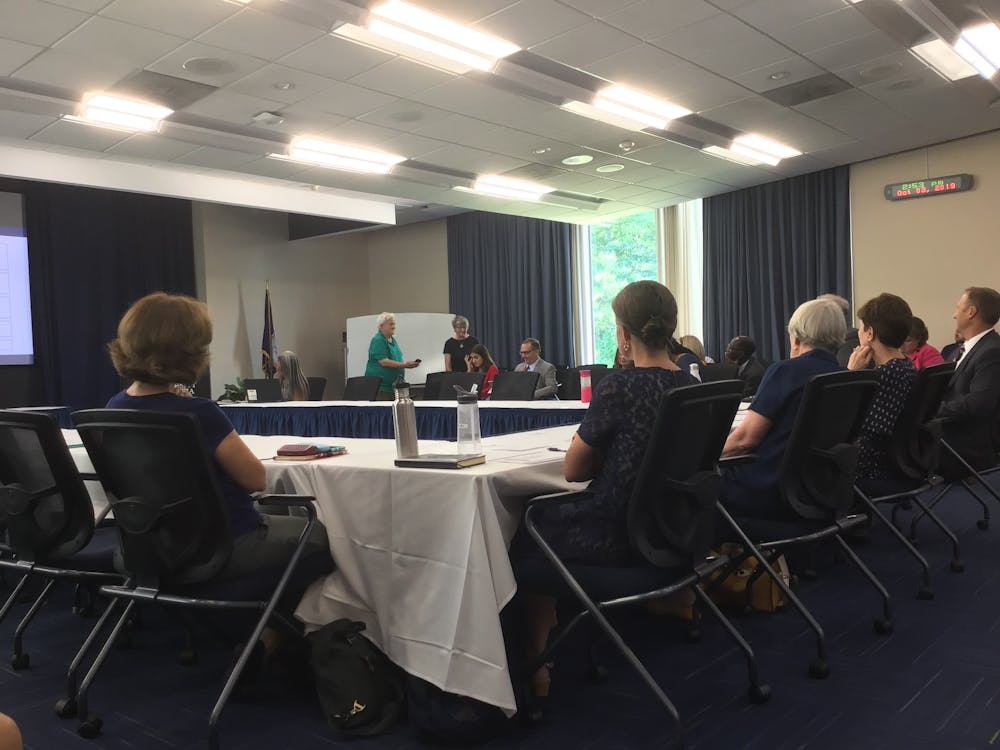The Planning and Coordinating Council met Thursday to discuss replacing itself with a new body — the Land Use and Environmental Planning Committee.
Comprised of representatives from the City of Charlottesville, Albemarle County and University, PACC was founded in 1986 and serves as an advisory body for land use issues in critical areas such as Ivy Road, the Bypass and Jefferson Park Avenue where the interests of all three entities intersect.
“This redefinition suggests establishing a working group of professionals to not just include land use and planning but also broaden that … to consider environmental and infrastructure issues,” County Executive Jeff Richardson said.
The successor to PACC, LUEPC, would include not only the three original bodies — the University, Albemarle County and Charlottesville — but also the U.Va. Foundation and the Rivanna Water and Sewer Authority. RWSA provides drinking water and wastewater treatment to the City and County with an emphasis on environmental sustainability. The U.Va. Foundation manages property for the University and provides financial services to U.Va. and 23 associated foundations and organizations.
In addition to an expansion in its primary members, LUEPC would require greater membership from each organization and add staff from City Hall and the County Office. These experts would advise on environmental sustainability and infrastructure alongside land use and planning.
LUEPC, just as PACC, would serve exclusively as an advisory board to the organizations involved and would make no formal decisions. PACC members noted during the Thursday meeting that the expansion of organizational objectives to include sustainability was necessary in order to better serve the needs of the contemporary community.
According to Senior Vice President for Operations Colette Sheehy, the University worked with the City and the Council on this proposal, and the University supports it.
“After 33 years, it is logical that organizations re-examine whether they are still serving the purpose they were created for,” Sheehy said. “The new committee will focus the work on the professionals with expertise to collaborate and develop the best solutions.”
Some members of the public in attendance at the Thursday meeting expressed skepticism about the newly proposed body and voiced concerns about losing an important intermediary body. The decision for PACC to dissolve itself was never publicly announced before the Thursday meeting.
While PACC meetings have been open to the public, LUEPC meetings will not, and members of the public present at the meeting expressed concerns about transparency with this fundamental change.
Richardson addressed these questions as to why he felt that it was a “cautionary” measure for LUEPC meetings to occur “out of the public eye”. Richardson pointed to the nature of the body’s meetings in which members present potential — not necessarily real — problems and solutions, and he felt that it may not be “appropriate” timing to include the public in the discussions.
Thursday’s meeting did not conclude with an official recommendation to dissolve PACC. Members of the body will return to their respective organizations for discussion about the proposal, and local officials said the item would be added to county council agendas for a meeting sometime in early November.
“There will be a full discussion of any recommendations with elected officials from both the City and the County and with the University leadership in a public setting,” Sheehy said.
With local elections coming up and the subsequent transition period with new officials, the earliest LUEPC could potentially become an official body would be early in 2020.







